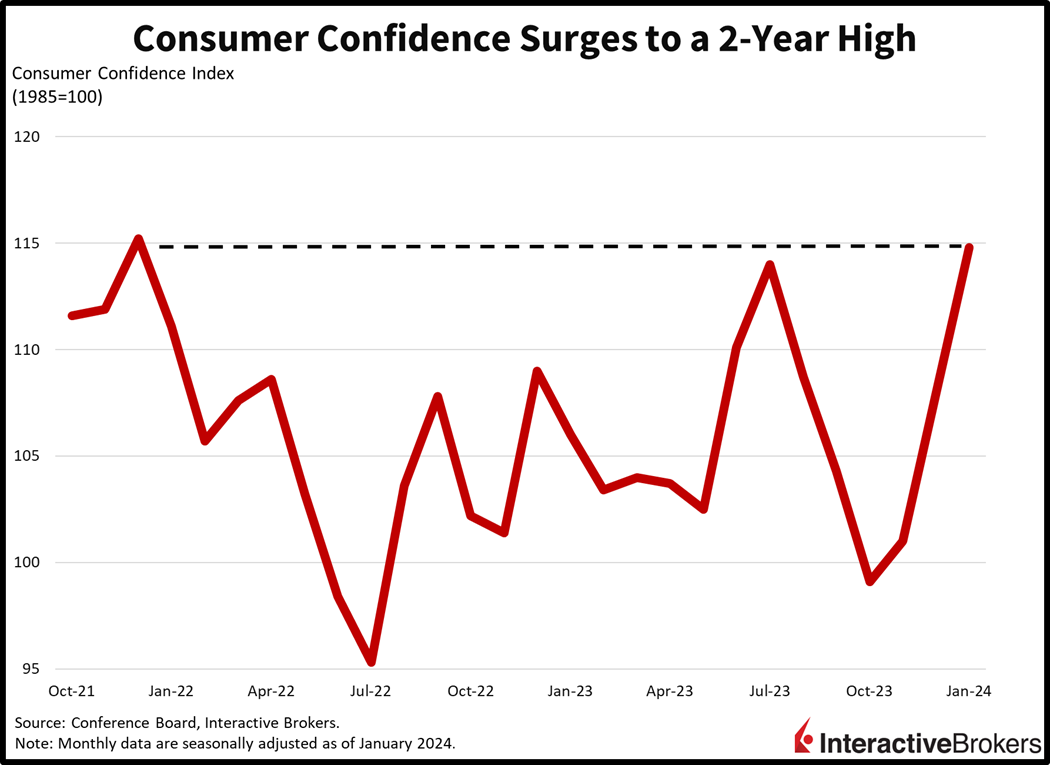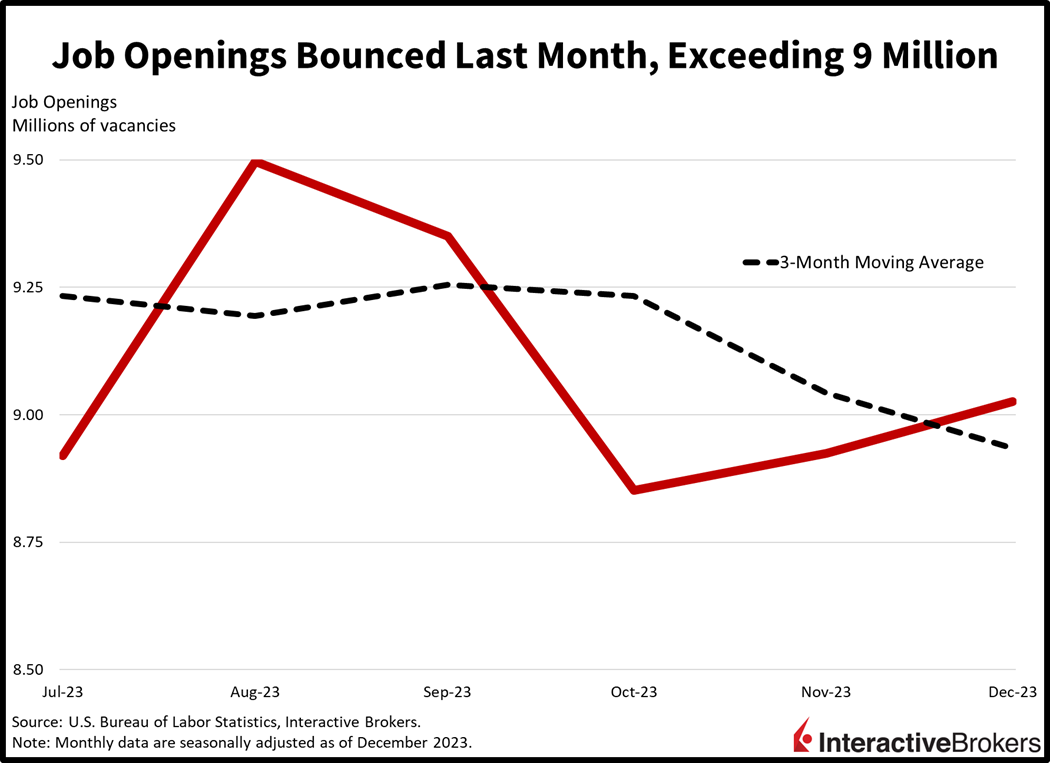Markets are steady today as investors feast on a buffet of economic data and corporate earnings, while patiently awaiting a trifecta of significant information set for release tonight and tomorrow. Major big tech companies will release earnings after the closing bell today as investors will learn the duration allocation of yesterday’s better-than-feared level of quarterly borrowing from the Treasury tomorrow morning. Tomorrow afternoon features Fed Chair Powell’s commentary on monetary policy which will be pivotal for a marketplace that is expecting 5 to 6 cuts this year. In the meantime, hotter-than-expected economic data continues to dominate the floor, with consumer confidence and job openings rising sharply. These factors are capping gains at the moment, with market players wondering if this morning’s data will tilt the Fed’s rhetoric tomorrow.
Consumer Confidence Soars on Higher Stocks
Consumers are feeling lovely as capital gains in their investment accounts, plentiful job opportunities and business possibilities support optimism. Notably, Consumer Confidence has surged to its highest level in over two years this month, reaching 114.8, in line with expectations and better than December’s 108. The present month’s reading, the highest since December 2021, was propelled by a notable increase in the Present Situations Index while the Expectations Index generated an increase of less magnitude. Indices for Present Situation and Expectations rose from 147.2 and 81.9 last month to 161.3 and 83.8 this month. Households also celebrated the outlook for lower interest rates.

JOLTS Disappoints Rate Outlook
Job openings rose to their highest elevation of the fourth quarter last month, surpassing 9 million for the first time since September. December’s 9.026 million in job openings was better than the projected 8.75 million and the previous month’s 8.925 million. The professional and business services category led with 239,000 additional job openings. Other top gainers included education and health services, up 73,000, and retail, up 50,000. In contrast, the leisure and hospitality and wholesale trade sectors weighed on the headline, surrendering 131,000 and 83,000 vacancies. Quits did decline to 3.4 million though, the lowest level in four years, as workers feel less confident about replacing their jobs amidst slower hiring.

European GDP Steady, Dodges Technical Recession
Across the Atlantic the European Union’s statistical office, Eurostat, reported flat GDP growth for the last quarter. The figure exceeded expectations of an unchanged -0.1% pace of decline from the third quarter. The continent’s largest economy, Germany, accelerated its decline from 0.2% to 0.3%, however, as manufacturing order weakness continues to weigh upon results. France managed to offset some of the pain, accelerating from 0.6% to 0.7%. The region avoided a technical recession for now, defined by two consecutive quarter of GDP contraction. Against the backdrop, upcoming revisions will be important to watch.
Labor Costs Become Increasingly Important
Recent earnings reports depict businesses struggling with labor costs and in some cases reducing employee headcounts as they struggle to maintain profits. Consider the following examples:
- Whirlpool will lay off an undisclosed number of corporate employees and has provided disappointing guidance due to higher costs and pricing pressure from increased competition. However, its fourth-quarter adjusted earnings per share (EPS) of $3.85 surpassed the analyst consensus expectation of $3.52 despite declining from $3.89 year over year (y/y). Its revenue of $5.09 billion exceeded the consensus estimate by $110 million and climbed from $4.9 billion in the year-ago quarter. Latin America sales climbed 17% while sales in Asia increased 8.7%. The company grew its market share in North America, resulting in a 1.3% y/y sales increase. Net sales in the Europe, Middle East and Africa region, however, dropped 3.2%. Whirlpool shares declined 4% last night after the company said it expects full-year 2024 sales of $16.9 billion while analysts expected $17.68 billion. Additionally, Whirlpool’s adjusted EPS full-year guidance ranging from $13 to $15 missed the $15.48 expected by analysts. Chief Financial Officer Jim Peters said a low volume of new home sales, which typically include homebuyers upgrading appliances, will continue to hurt sales in the US and consumers are being price conscious when they replace broken appliances. The company will cut $400 million in expenses this year by finding lower cost materials and reducing its workforce.
- United Parcel Service said it will lay off 12,000 employees and it issued weaker-than-expected full-year guidance. It also posted fourth-quarter sales that missed the analyst expectation. In the US, daily shipping volumes declined 7.5% y/y while international volumes declined 8.3%. US volumes declined, in part, due to shoppers returning to brick-and-mortar stores as an alternative to online sales. Additionally, contentious union negotiations caused the company to lose customers. For the quarter, revenue dropped 7.8% y/y to $24.92 billion, missing the consensus expectation of $25.48 billion. Profits fell more than 50% to $1.61 billion. After adjusting for one-time expenses, the company’s EPS of $2.47 declined from $3.62 y/y but narrowly beat the analyst expectation of $2.46. Chief Executive Carol Tomé said a combination of higher wages resulting from the labor contract approved in 2023 and declining sales will hurt profits this year. With that in mind, the company will save about $1 billion in costs by laying off workers and it has already reduced its air cargo flights. UPS’ 2024 outlook expects revenue to range from $92 billion to $94.5 billion, considerably below the $95.7 billion expected by analysts. It expects an adjusted operating margin of 10% to 10.6%, missing the analyst expectation of 11.3% and dropping from 10.9% in 2023. UPS shares tanked approximately 7.6% in early trading.
- GM said labor strikes cost the company $1.1 billion and sales were weak in China, but the company’s fourth-quarter profits of $2.1 billion climbed 5% y/y. GM attributed the results to strong sales in the US and pricing power. The company, which is a big dividend payer, produced an adjusted EPS of $1.24, which beat the consensus expectation of $1.12, but fell from $2.12 in the year-ago quarter. Its revenue of $42.9 billion declined nearly 1% y/y but significantly surpassed the $38.7 billion analyst expectation. The somewhat stable revenue occurred even with the six-week long strike by the United Auto Workers resulting in lost sales of approximately 95,000 vehicles. GM expects its full-year adjusted EPS before interest and taxes to range from $8.50 to $9.50, a slight gain from last year. Analysts expected guidance to match last year’s results.
Markets Take a Break
Stocks are down and yields are higher today as one of Chair Powell’s preferred indicators, job openings, beat by over a quarter-million. Chair Powell frequently cites declining job openings amidst low unemployment as a favorable development concerning the trajectory of inflation. The ideal result is that the labor market cools and wage gains slow without massive layoffs, keeping money in people’s pockets, supporting consumer demand and capping consumer credit delinquencies. But the second consecutive month of increasing job openings supports wage increases, thereby boosting labor costs and working against the Fed’s 2% inflation target, likely tilting Powell’s talking points toward the hawkish side tomorrow.
All major US equity indices are lower with the small-cap Russell 2000 and tech-heavy Nasdaq Composite indices leading the charge; they’re off by 0.9% and 0.4%. The S&P 500 and Dow Jones Industrial indices are each lower by 0.1%, meanwhile. Sectoral breadth is deeply negative, with all segments lower except for financials, consumer discretionary and materials; they’re up 0.7%, 0.2% and 0.1%, respectively. Real estate, utilities and technology are leading the way lower, with the sectors down 0.8%, 0.6% and 0.4%. Bond yields reversed their trajectory lower after hot economic data tilted them the other way. The 2- and 10-year Treasury maturities are trading at 4.37% and 4.09%, 5 and 2 basis points (bps) higher on the session. Tighter Fed policy anticipations and stronger inflation expectations are helping the dollar, as its index trades at 103.55, up 9 bps today. The greenback is gaining against the pound sterling, franc, yuan, yen and Aussie and Canadian dollars while it loses ground relative to the euro. Energy markets are lifting price pressure projections against the backdrop of intensifying geopolitical tensions in the Middle East, including the Red Sea, and Beijing. WTI crude oil is trading at $77.53 per barrel, higher by 0.8%, or $0.60 cents on the session.
Gearing Up for an Eventful Wednesday
Tomorrow may be significant for markets, as the cross currents of big-tech earnings, the ADP jobs report, the distribution of Treasury issuance and Powell comments meet at a critical juncture. I’m expecting Powell to take some rate cuts off the market’s table by perhaps even calling current projections aggressive. The aftermath of the conference may shift the market’s pricing from five to six cuts down to three to four and lift yields notably as a result. Meanwhile, market players will be eager to hear about artificial intelligence (AI) developments from big tech. Are the projects boosting the bottom line? Or is enhanced profitability distant? On the Treasury front, Secretary Yellen may decide to continue funding the federal government through short-term borrowing rather than committing to higher yields over the long-term. With stocks near all-time highs amidst relentless animal spirits and irrational exuberance, tomorrow’s confluence of events may spark market volatility.
Visit Traders’ Academy to Learn More About Consumer Confidence and Other Economic Indicators.
Disclosure: Interactive Brokers
Information posted on IBKR Campus that is provided by third-parties does NOT constitute a recommendation that you should contract for the services of that third party. Third-party participants who contribute to IBKR Campus are independent of Interactive Brokers and Interactive Brokers does not make any representations or warranties concerning the services offered, their past or future performance, or the accuracy of the information provided by the third party. Past performance is no guarantee of future results.
This material is from IBKR Macroeconomics and is being posted with its permission. The views expressed in this material are solely those of the author and/or IBKR Macroeconomics and Interactive Brokers is not endorsing or recommending any investment or trading discussed in the material. This material is not and should not be construed as an offer to buy or sell any security. It should not be construed as research or investment advice or a recommendation to buy, sell or hold any security or commodity. This material does not and is not intended to take into account the particular financial conditions, investment objectives or requirements of individual customers. Before acting on this material, you should consider whether it is suitable for your particular circumstances and, as necessary, seek professional advice.

